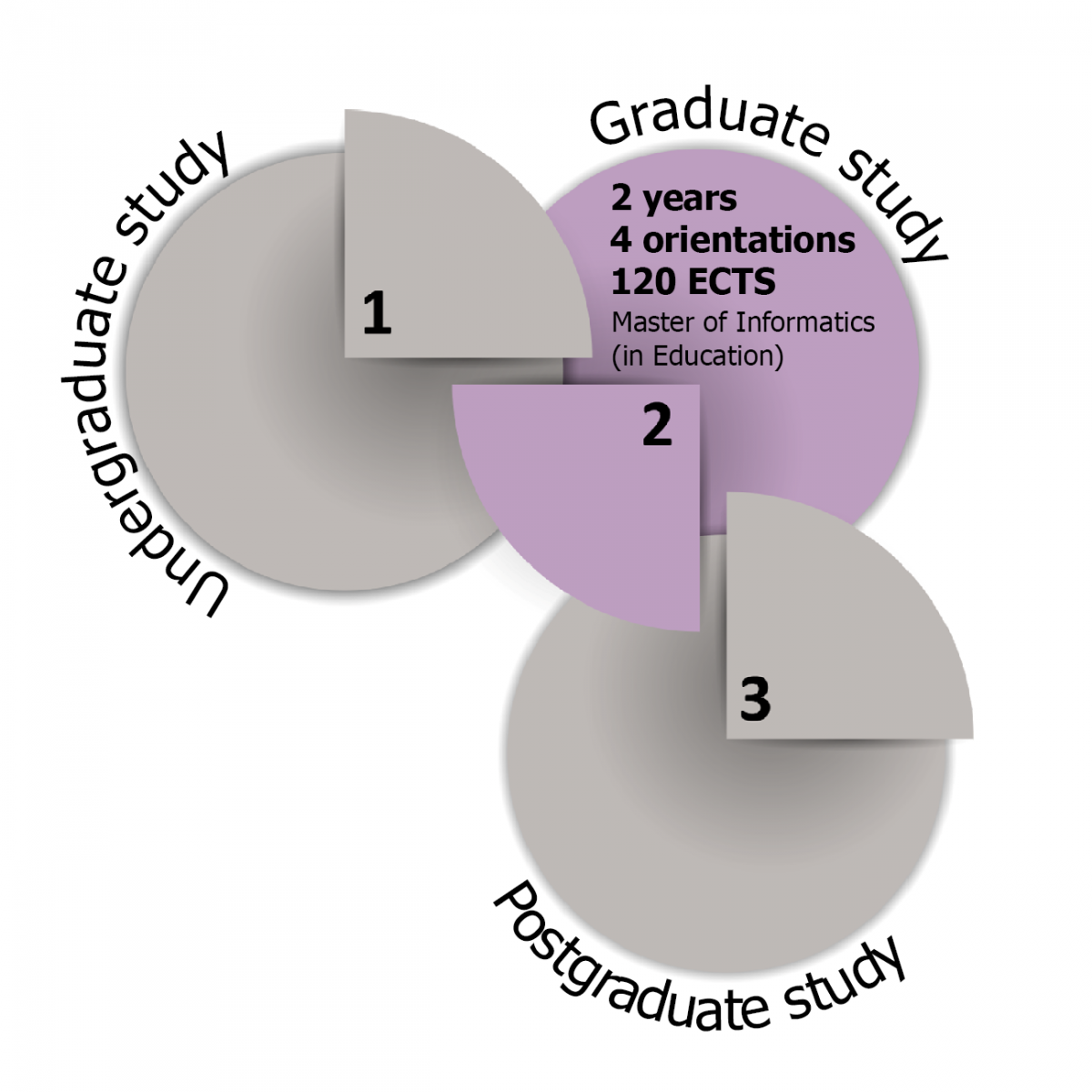
There are four study programme orientations available within the graduate studies in Informatics: Information and Software Engineering (IPI), Business Systems Organization (OPS), Databases and Knowledge Bases (BPBZ) and Teacher of Informatics (TI).

About the Study Programme Orientations
The primary aim of the graduate study is to deepen the basic theoretical knowledge acquired at the undergraduate level and to gain new insights required for solving problems concerning fairly complex aspects of development and implementation of information technology on the one hand and for improving the efficiency of modern organizations on the other.
Graduate Programme of Informatics in Numbers
The duration of graduate study is nominally two years and a student is required to earn the minimum of 120 ECTS points in accordance with the pre-defined classification of subjects.
New knowledge
Upon successful finishing their studies the students gain the key knowledge and experience within the chosen field.
By finishing the graduate study of Information and Software Engineering (IPI) the students gain the theoretical and practical knowledge necessary for the successful development, implementation and application of different information systems.

New knowledge
Upon completing the Information and Software Engineering graduate programme of study students are expected to have acquired knowledge in the following key areas:
- More advanced knowledge of technology and infrastructure enabling the operation of contemporary information systems.
- Special attention is given to areas such as software systems networking, multilayer software structures, object-oriented and component paradigm of software development etc.
- Understanding of the overall lifecycle of projects related to information system development and implementation in the context of a business system development strategy.
- Theoretical competencies associated with certain components of information systems, that is, special cases of implementation of information technology.
- Effective use of software tools and generators of applications development.
- Effective use of software tools for modelling and reorganization of business processes.
- Development of multilayer Web architecture.
- Management of developmental projects and software systems implementation.
ECTS Credits
Check structure for IPI!
Upon completing the graduate study students acquire the level of understanding and knowledge in the above-mentioned areas sufficient for solving fairly complex problems and articulating the competent solutions independently. The competencies gained also enable students to take an interdisciplinary approach in order to grasp the essence of a certain problem, which is of vital importance in ICT careers.
Academic title
After finishing their studies students acquire the title Master of Informatics.
Enrolment Terms
The Information and Software Engineering graduate study programme orientation represents a logical continuation of the Information Systems programme at the undergraduate level. However, students graduating from the undergraduate study Business Systems can also enrol the Information and Software Engineering graduate programme provided they pass the exams that represent entry competences for the programme.
Upon completing the Business Systems Organization (OPS) graduate study programme the students gain the knowledge and experience necessary for the efficient management of different business and information systems.

New knowledge
Upon completing the Business Systems Organization graduate study programme orientation students are expected to have acquired knowledge in the following key areas:
- Theoretical competencies essential for managing business and information systems within a company at its medium level upwards.
- Understanding of the laws of the contemporary market and the companies' survival in the market. Knowledge of technology and infrastructure required for the operation of modern information systems.
- The level of knowledge should be sufficient for understanding of their functionality, without entering the developmental domain.
- Effective management of business processes and organizations by applying information technology.
- Comprehensive knowledge of business functions and contemporary business management.
- Effective use of software tools for modelling and reorganization of business processes.
ECTS Credits
Check structure for OPS!
Upon finishing this graduate study programme orientation students acquire a level of understanding and knowledge in the above-mentioned areas enabling them to creatively enter the world of e-business, enterprise and contemporary market. The competencies gained also enable students to connect business models and information technology thus conceiving a way to manage organizations in the context of the increasingly complex global market.
Academic title
After completing their studies students acquire the title Master of Informatics.
Enrolment Terms
The Business Systems Organization graduate programme of study presents a logical continuation of the Business Systems programme at the undergraduate level. However, students graduating from the undergraduate study Information Systems can also enrol the Business Systems Organization graduate programme provided they pass the exams that represent entry competences for the programme.
Upon completing the Databases and Knowledge Bases (BPBZ) graduate study the students gain the knowledge and experience necessary to be able to design, create and administer the databases and the bases of knowledge.

New knowledge
Upon completing the Databases and Knowledge Bases graduate study programme orientation students are expected to have acquired knowledge in the following key areas:
- Advanced theoretical competencies associated with knowledge and databases.
- Data structures and key algorithms in the database and knowledge base domain.
- Query languages in databases, especially SQL.
- Fairly advanced models of data analysis.
- Database and knowledge base design.
- Database and knowledge base administration.
- Selection and assessment of software tools used in databases and knowledge bases.
- Effective use of software tools for data analysis (OLAP).
- Database and knowledge base integration into a wider context of information systems (classical information systems, semantic web, multiagent systems, business rules systems).
ECTS Credits
Check structure for BPBZ!
Academic title
After finishing their studies the students acquire the title Master of Informatics.
Enrolment Terms
The Databases and Knowledge Bases graduate study programme orientation presents a logical continuation of the Information Systems programme at the undergraduate level. However, the students graduating from the undergraduate study Business Systems can also enrol the Databases and Knowledge Bases graduate programme provided they pass the exams that represent entry competences for the programme.
Upon completing the Theacher in Informatics (TI) graduate study programme the students gain the professional and pedagogical knowledge and experience necessary to teach Informatics on primary and secondary education levels.

New knowledge
Upon completing the Informatics in Education graduate study programme orientation the students are expected to have acquired sufficient technical knowledge as well as that of pedagogy required for teaching informatics in primary and secondary schools.
Academic title
After finishing their studies the students acquire the title Master of Informatics in Education.
ECTS Credits
Check structure for IO!
Enrolment Terms
This study programme orientation presents a logical continuation of the Information Systems programme at the undergraduate level. However, the students graduating from the undergraduate study Business Systems can also enrol the Informatics in Education graduate programme provided they pass the exams that represent entry competences for the programme.




